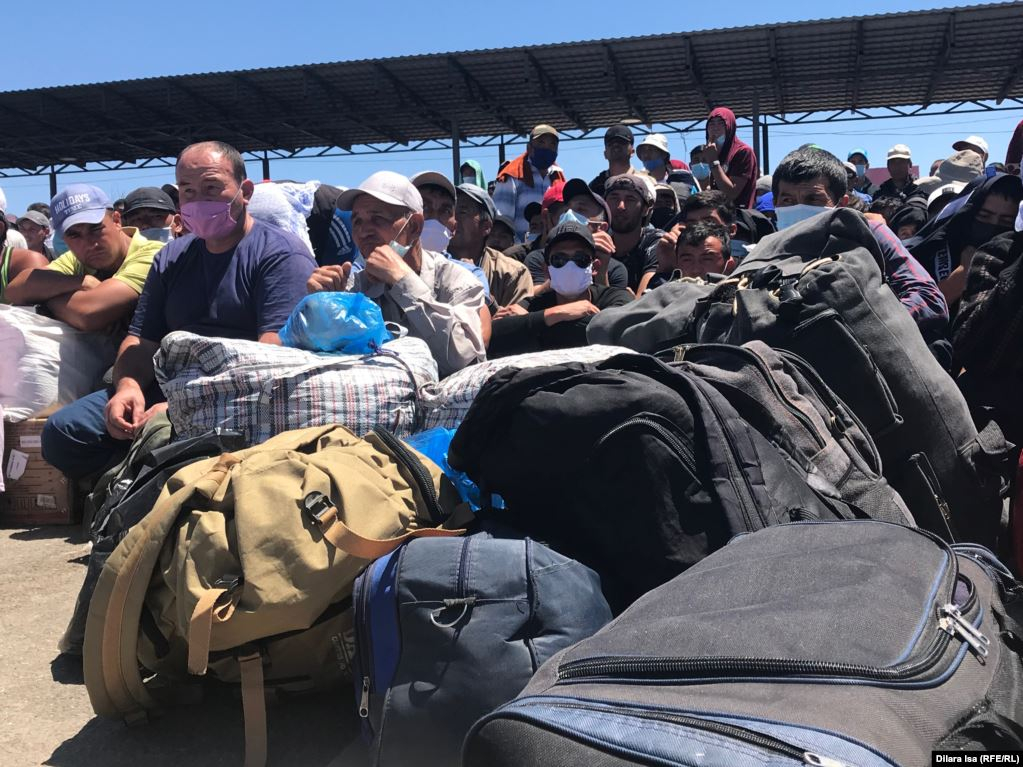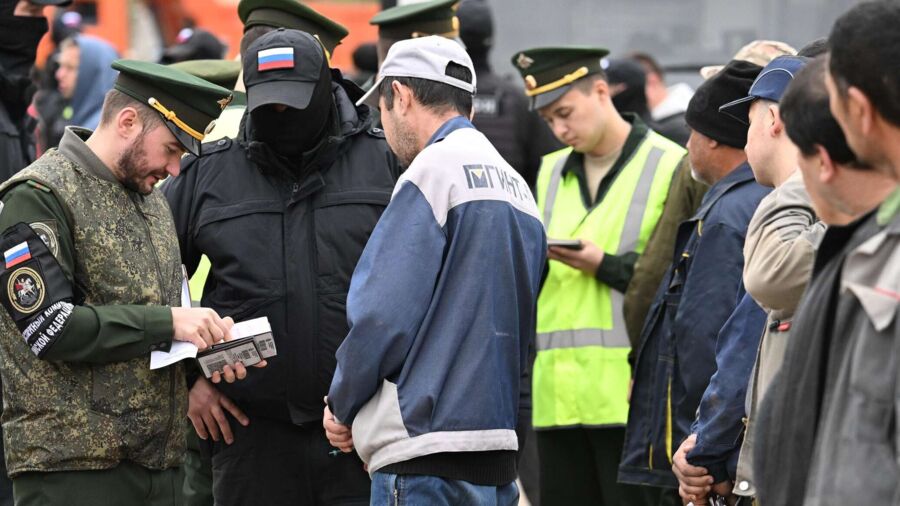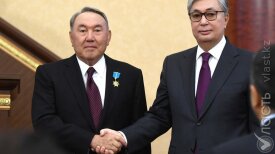Living and working in Russia with an Uzbek passport is becoming increasingly dangerous. Uzbekistan’s government is trying to redirect traditional flows of labor migration to other countries.
The killing in mid-December of Russian general Igor Kirillov and his assistant in Moscow was pinned on an Uzbek citizen, who allegedly confessed. Russian authorities also said he was recruited and trained by Ukrainian intelligence services. After every such incident, allegedly involving Central Asians, waves of xenophobia hit migrant communities.
Читайте этот материал на русском.
On the Way Out
Mukhabbat, 65, has three sons who all work in Russia. She lives in Yakkabag, a small town in southern Uzbekistan. When she talks about her sons, her voice becomes shaky, her eyes swell up with tears. Their children, her grandchildren, sleep in the next room.
“My heart pounds when I hear about how the police beat people who just came to work. After the war began, my sons told me that they were offered Russian citizenship if they joined the Russian army. I cried and asked them not to do this. For the sake of their children,” Mukhabbat said, wiping away her tears. “I'm always afraid that they will suddenly stop communicating.”
There are no young people on the streets of the village of Kishlik, which is a couple of hours’ drive from the southern city of Samarkand and not far from Yakkabag. Most of them have gone to earn money in Tashkent or abroad. This is a typical picture of rural settlements in today’s Uzbekistan.
Old pensioners sit around a small village store. Upon seeing an out-of-towner, they start talking to me, seemingly out of boredom. The elderly said that there once were enough jobs and money for everyone. Now, Uzbekistan’s provincial youth has nothing to look for.
The group said they miss their children and grandchildren, some of whom have not returned for years. They know well about the worsening attitude towards labor migrants in Russia.
Abduvohid, 75, stuffed some naswar into his mouth and stuttered that last year his son, who worked in Moscow, was attacked by two Russian guys. The son was injured, but miraculously managed to escape.
“Had his friends not showed up in time, those bad guys probably would have killed my son,” Abduvohid said.
Abduvohid receives a pension of 1.5 million soums (about $120) per month. Through his son’s remittances, his family was able to survive, build a house, and even hold weddings.
Dependence on Russia
The Uzbek government now plans to redirect labor migrants, traditionally traveling to Russia, to other high-income countries.
“In 2025 alone, we plan to take measures to employ more than 200,000 citizens in 21 economically developed countries, such as Germany, Great Britain, Japan, South Korea, Israel, Canada, Poland, Turkey, Saudi Arabia, the UAE, and others,” Prime Minister Abdulla Aripov said on November 20 during his parliamentary hearing for his re-appointment.
According to official data, there are currently 1.14 million labor migrants abroad. At the beginning of the year, there were 1.7 million.
These figures, however, only reflect those who hold work permits. The real figure is certainly higher, because many work without papers.
In November, Aripov also presented to parliament his cabinet’s Action Program for the near future, based on the presidential strategy “Uzbekistan-2030”. In addition to redirecting labor migration flows, it provides for the creation of more than 2.5 million “high-paying jobs” within the country and improving working conditions in agriculture.
The country’s economy, especially in rural areas, depends on remittances that labor migrants send to their families. In the first ten months of 2024 alone, remittances amounted to more than $12 billion, which is 34% higher than in the same period last year.
According to the Central Bank, $9.8 billion (or 78% of the total volume of money transfers) came from Russia, and over $600 million came from Kazakhstan.
Alisher Ilkhamov, Director of London-based Central Asia Due Diligence, believes that the issue of redistributing the flow of labor migrants from Uzbekistan has been on the agenda for a long time.
“The massive numbers of migrants going to Russia has created a dependency, limiting Uzbekistan’s sovereignty and creating significant risks for Uzbek migrants themselves, because of their being forced to participate in the war in Ukraine and the anti-migrant hysteria unleashed in Russia. And this process of redistribution has recently accelerated,” Ilkhamov told Vlast in an interview.
According to Ilkhamov, economic conditions in Uzbekistan are still unfavorable, leading to large flows of labor migration. Despite the promise of economic liberalization, the government is implementing its policies too slowly and inconsistently, still maintaining elements of command-and-control management methods, for example, in agriculture.
“The country has not yet achieved a fully free and fair market competition. And this is largely due to the incompetence of the state apparatus. The government often makes arbitrary decisions. There is no transparency or accountability in the recruitment of public officials. Success in the economy cannot be achieved without a public administration reform,” Ilkhamov said.
Botir Shermukhammedov, the editor-in-chief of Migrant.uz, believes that it is currently impossible to redirect the entire flow of migrants to high-income countries.
“We must understand that this is a very long and complex process. In 2023, the Agency for External Labor Migration sent only 38,000 Uzbeks to work abroad, instead of the planned 200,000. In my opinion, the agency, with its existing infrastructure, is not at all ready to send as many as 200,000 of our fellow citizens a year to work abroad. There are simply not as many applications,” Shermukhammedov argued.
Although the flow of new labor migrants to Russia has noticeably decreased, Shermukhammedov believes that it is still necessary to negotiate with Russian officials on the repeated violations of their labor rights as well as their recruitment for the war.
“We should not forget that Uzbekistan and Russia signed an agreement on allied relations and an agreement on strategic partnership. We must demand that our citizens be treated well in Russia. That is, in the same way as Russians are treated in Uzbekistan,” Shermukhammedov told Vlast.
Despite the government’s willingness to employ some of the returnees from Russia, this policy is unlikely to succeed. Uzbekistan’s population now stands at more than 37.5 million people, 22.5 million of whom are employed. According to official data, the unemployment rate is declining (6.8% among the working-age population in 2024, compared to 8.1% a year earlier). But a wave of returnees, as well as those deported by the Russian authorities, could spoil these optimistic statistics.
“I know Russian, but now I am learning English”
Russia and Kazakhstan remain the favorite destinations for labor migrants from Uzbekistan.
The exact number of Uzbeks working abroad is difficult to ascertain. The Agency for External Labor Migration claims that there are about 2-3 million people. Some experts say the figure could be as high as five million. During his visit to Tashkent in May last year, Russia’s President Vladimir Putin said that about one million Uzbeks were working in Russia at the time. Most likely, these are those who have officially registered and hold a work permit.
“The Russian authorities are doing and will do everything necessary to provide decent working conditions and social protection for Uzbek citizens working for us. We will continue to interact with the Uzbek authorities on all pressing issues of the migration dossier," Putin said.
But despite his promises, the attitude towards labor migrants in Russia is only worsening. This is especially noticeable after the terrorist attacks in the Moscow region in the spring of 2024 and the recent murder of a high-ranking official of the ministry of defense, Lieutenant General Igor Kirillov, and his assistant. A citizen of Uzbekistan is a suspect in the Kirillov murder.
A wave of xenophobia, as well as pressure to enlist with the ministry of defense, forced many Uzbeks and people from other Central Asian republics to return to their homeland. Since the beginning of this year, more than 467,000 labor migrants have returned to Uzbekistan: 257,000 from Russia, 129,000 from Kazakhstan, 14,000 from Korea, and more than 66,000 from other countries, the government reported.
Ilkhom, 44, is a native of Andijan in eastern Uzbekistan, he worked in Russia for more than twenty years. In mid-October 2023, he was summoned to one of the St. Petersburg police departments and persistently offered to enlist in the army.
“They told me that this would get a lot of money and Russian citizenship. At that time, I worked as a gravedigger at one of the city cemeteries. I told the police that I have a large family in Andijan, a wife and five children. Besides, I am a citizen of Uzbekistan and do not need a Russian passport," the former labor migrant told Vlast.
In Uzbekistan, enlisting for a foreign army is punishable by up to 10 years in prison and Ilkhom knows this. He said that he was eventually released, but continued to be summoned afterwards. This pressure led Ilkhom to decide to leave Russia for good.
“I know that the Russian army fighting in Ukraine needs soldiers, but this is not our war. Some of my fellow countrymen have agreed to become contractors and go to the front. They are attracted by money and the opportunity to obtain citizenship,” Ilkhom said.
The bureaucratic pressure is heavier on Uzbeks whose level of Russian could be not good enough to fully understand the forms they are offered to sign. Sometimes army slips are mixed with other documents that workers need to sign.
Now, Ilkhom works as a taxi driver in Tashkent and is not planning to return to Russia yet.
“After the war with Ukraine began, both the police and ordinary Russians became more aggressive towards foreigners. I don’t understand: what is our fault? We came to work! Maybe I will return to Russia, but only after the war is over. Or maybe I will go to another country. My Russian is not bad, but now I am learning English.”
Поддержите журналистику, которой доверяют.









